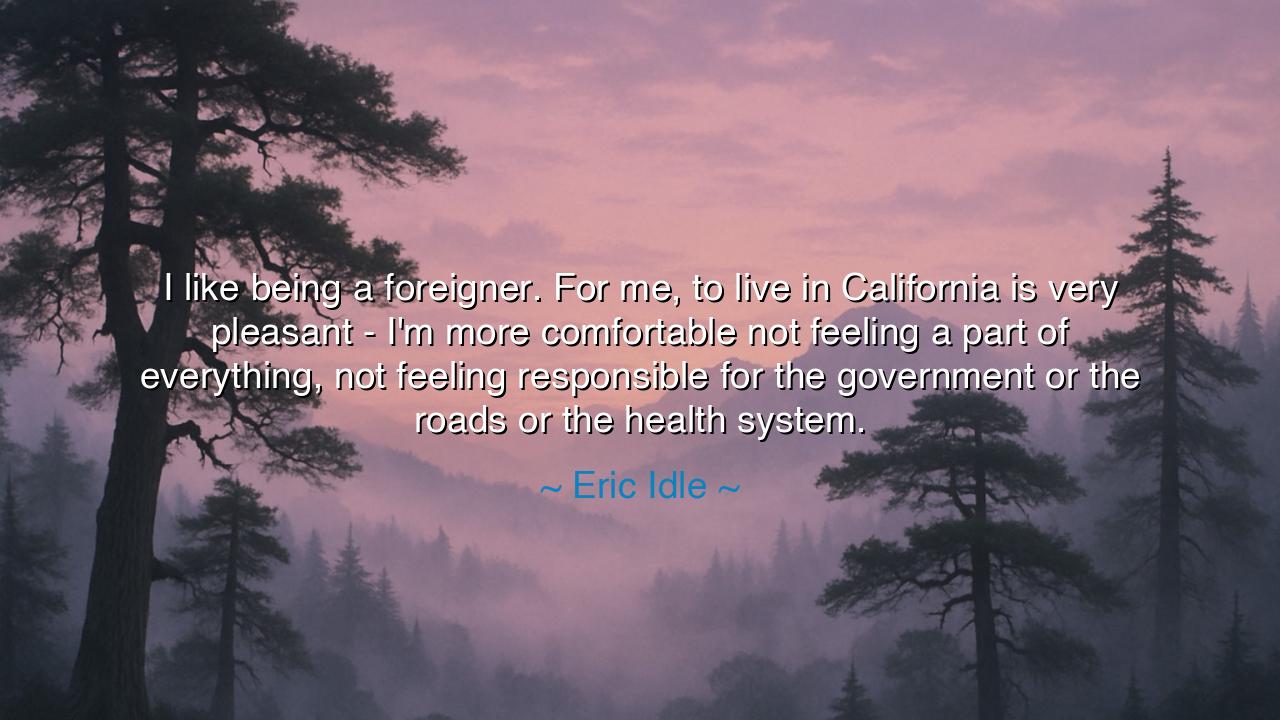
I like being a foreigner. For me, to live in California is very
I like being a foreigner. For me, to live in California is very pleasant - I'm more comfortable not feeling a part of everything, not feeling responsible for the government or the roads or the health system.






In the reflective and mischievous words of Eric Idle, one of the great jesters of our age, there lies a truth that dances between humor and philosophy: “I like being a foreigner. For me, to live in California is very pleasant — I'm more comfortable not feeling a part of everything, not feeling responsible for the government or the roads or the health system.” On the surface, these words may seem light — the musings of a man who delights in detachment — yet beneath their playfulness flows a deep current of wisdom. Idle, a master of satire and observation, reveals the quiet joy of standing apart, of finding peace not in belonging, but in freedom from burden. He reminds us that sometimes, to live well, one must learn the art of non-attachment, of watching life unfold without the weight of ownership.
Eric Idle, famed for his wit as part of Monty Python, has long been a traveler between worlds — a Briton in America, a comedian among philosophers, a poet hidden within laughter. His life, like his words, speaks of the wanderer’s paradox: that in being foreign, one may find a clearer sense of self. By living outside one’s homeland, by observing rather than owning, one gains a perspective that the rooted often lose. In his humor lies a hint of stoicism — that ancient wisdom which teaches that serenity comes not from control, but from acceptance. To “not feel responsible for the government or the roads or the health system” is not indifference, but liberation from illusions of control — an understanding that the world will turn as it must, and that peace is found in letting it be so.
The ancients, too, honored this stance of the observer, the one who lives among men but is not consumed by their concerns. Diogenes of Sinope, the cynic philosopher, wandered the streets of Athens with no home, no title, no nation, declaring himself a “citizen of the world.” To him, the truest freedom was not in wealth or status, but in belonging nowhere — and thus, everywhere. Like Idle, Diogenes found humor in humanity’s seriousness, wisdom in its absurdity. His foreignness was not merely geographic, but spiritual — the state of seeing the world with eyes unclouded by possession or pride. In every age, there are those who, like them, find truth at the margins, peace in the periphery.
To live as a foreigner, as Idle suggests, is to embrace life as a visitor, to see the world not as something to be controlled, but as something to be experienced. It is to walk through the markets and mountains of existence with curiosity, not entitlement. When one is foreign, the heart is awake — every sound is strange, every sight is vivid, every custom a mirror for reflection. The familiar dulls the senses; the unfamiliar sharpens them. Thus, being a foreigner is not merely a state of geography, but a discipline of the soul — to remain ever curious, ever humble, ever free from the blindness of habit.
Yet, beneath this freedom lies a gentle melancholy — for to be foreign is also to stand apart. The foreigner watches the fires of others’ belonging from a quiet hill. He is not burdened by duty, but neither is he embraced by familiarity. Idle, with his characteristic irony, celebrates this solitude as comfort, yet there is a whisper of truth in his jest: that detachment, though freeing, also demands courage. For it is easier to drown in the noise of belonging than to stand alone in the stillness of distance. To live as a foreigner, then, is an act of courageous acceptance — to find joy in impermanence, peace in the passing, and laughter in life’s absurdity.
Consider the story of Albert Einstein, who, though born in Germany, spent much of his life as a foreigner — in Switzerland, then in the United States. Though he changed nations, he never sought belonging to any government or creed. “Nationalism,” he once said, “is an infantile disease.” Einstein, like Idle, found clarity in distance. His genius was nourished not by patriotism, but by perspective — the freedom to think beyond borders, to imagine beyond institutions. It was this distance that allowed him to glimpse the unity beneath all things, the universal laws that govern both star and atom. In the heart of the foreigner lies such vision: the ability to see not nations, but humanity; not systems, but the living whole.
So, my listener, take this teaching to heart: learn to be a foreigner in the world, even in your own home. Do not bind your peace to politics, or your joy to circumstance. Live lightly upon the earth, as one passing through. Observe, appreciate, but do not cling. In doing so, you will discover what the wise of every age have known — that detachment is not apathy, but freedom; not withdrawal, but awakening. Be part of life’s dance, but do not forget that the music will play on, with or without your control.
And thus, as Eric Idle reminds us with a smile and a sigh, there is wisdom in stepping back, in laughing gently at the seriousness of the world. Be like the foreigner who sees clearly, loves freely, and carries no weight but wonder. For the world belongs not to those who claim it, but to those who cherish it — and then, with gratitude, let it go.






AAdministratorAdministrator
Welcome, honored guests. Please leave a comment, we will respond soon